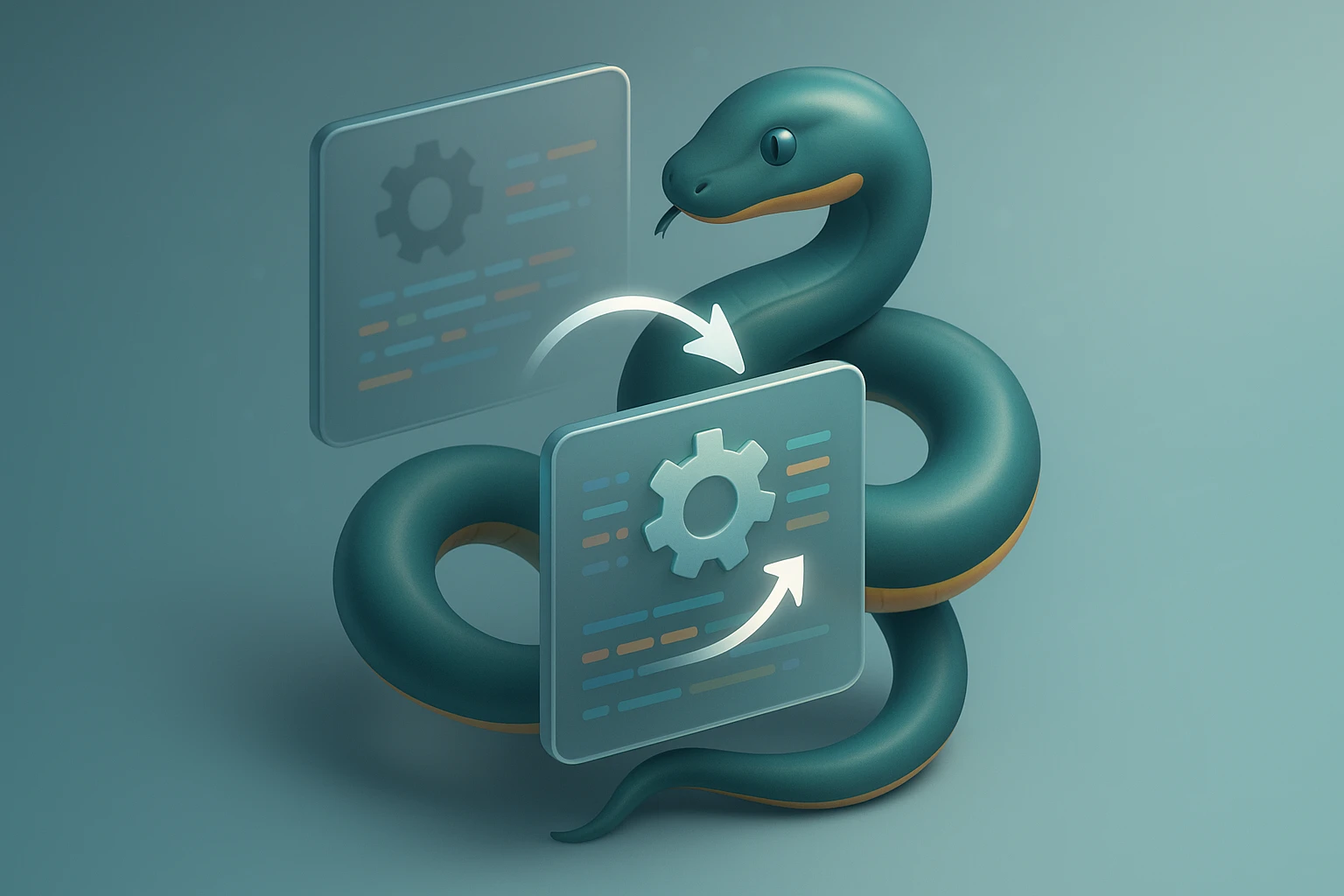How to Override Methods in Python
Illustration showing Python3 class inheritance: a base class method overridden by a subclass, with arrows and code snippets highlighting method name, signature, and call resolution.

Why Mastering Method Overriding Matters for Every Python Developer
When you're building applications in Python, you'll inevitably encounter situations where the default behavior of a class doesn't quite fit your needs. This is where method overriding becomes not just useful, but essential. Whether you're working with inherited classes, customizing framework behavior, or creating sophisticated object-oriented designs, understanding how to properly override methods can transform your code from rigid and repetitive to flexible and elegant.
Method overriding is a fundamental concept in object-oriented programming that allows a subclass to provide its own implementation of a method that's already defined in its parent class. Think of it as taking a recipe from your grandmother and adjusting it to suit your taste—the foundation remains, but you're adding your personal touch. This mechanism enables polymorphism, code reusability, and the creation of specialized behaviors without modifying the original class structure.
Throughout this comprehensive guide, you'll discover the technical mechanics behind method overriding, practical implementation strategies, common pitfalls to avoid, and advanced techniques that professional developers use daily. You'll learn when to override methods, how to do it correctly, and most importantly, how to leverage this powerful feature to write cleaner, more maintainable code that scales with your project's complexity.
The Fundamental Mechanics of Method Overriding
At its core, method overriding in Python occurs when a child class defines a method with the same name as a method in its parent class. When you call that method on an instance of the child class, Python executes the child's version rather than the parent's. This behavior is automatic and doesn't require any special keywords or decorators, though Python provides tools to make the process more explicit and maintainable.
The simplicity of Python's approach to method overriding stems from its dynamic nature. Unlike statically typed languages that require explicit override declarations, Python determines which method to call at runtime based on the object's actual type. This flexibility makes overriding straightforward but also requires careful attention to ensure you're implementing the behavior you intend.
class Animal:
def make_sound(self):
return "Some generic sound"
def move(self):
return "Moving in some way"
class Dog(Animal):
def make_sound(self):
return "Woof! Woof!"
def move(self):
return "Running on four legs"
class Bird(Animal):
def make_sound(self):
return "Chirp chirp!"
def move(self):
return "Flying through the air"
# Testing the overridden methods
generic_animal = Animal()
dog = Dog()
bird = Bird()
print(generic_animal.make_sound()) # Output: Some generic sound
print(dog.make_sound()) # Output: Woof! Woof!
print(bird.make_sound()) # Output: Chirp chirp!In this example, both Dog and Bird classes override the make_sound and move methods from their parent Animal class. Each subclass provides its own specific implementation, demonstrating how the same method name can produce different behaviors depending on the object type.
"The power of method overriding lies not in replacing functionality, but in specializing it while maintaining a consistent interface across different object types."
Understanding the Method Resolution Order
Python uses a specific algorithm called Method Resolution Order (MRO) to determine which method to call when dealing with inheritance hierarchies. This becomes particularly important when working with multiple inheritance, where a class inherits from more than one parent class. The MRO ensures that Python follows a consistent, predictable path when searching for methods.
You can inspect the MRO of any class using the __mro__ attribute or the mro() method. This information is invaluable when debugging complex inheritance structures or understanding why a particular method implementation is being called.
class A:
def process(self):
return "Processing in A"
class B(A):
def process(self):
return "Processing in B"
class C(A):
def process(self):
return "Processing in C"
class D(B, C):
pass
# Examining the Method Resolution Order
print(D.__mro__)
# Output: (, , , , )
instance = D()
print(instance.process()) # Output: Processing in BWorking with the Super Function
One of the most powerful tools when overriding methods is Python's super() function. This built-in function allows you to call methods from a parent class within your overridden method, enabling you to extend functionality rather than completely replace it. This approach promotes code reusability and maintains the benefits of inheritance while adding specialized behavior.
The super() function is particularly valuable when you want to preserve the parent's logic and add additional processing before or after it. This pattern appears frequently in real-world applications, especially when working with frameworks or libraries where you need to customize behavior without losing the original functionality.
class BankAccount:
def __init__(self, account_number, balance):
self.account_number = account_number
self.balance = balance
def deposit(self, amount):
if amount > 0:
self.balance += amount
return f"Deposited ${amount}. New balance: ${self.balance}"
return "Invalid deposit amount"
def withdraw(self, amount):
if amount > 0 and amount <= self.balance:
self.balance -= amount
return f"Withdrew ${amount}. New balance: ${self.balance}"
return "Invalid withdrawal amount"
class SavingsAccount(BankAccount):
def __init__(self, account_number, balance, interest_rate):
super().__init__(account_number, balance)
self.interest_rate = interest_rate
self.withdrawal_count = 0
def withdraw(self, amount):
self.withdrawal_count += 1
if self.withdrawal_count > 3:
fee = 5
amount += fee
result = super().withdraw(amount)
return f"{result} (Fee of ${fee} applied after 3 withdrawals)"
return super().withdraw(amount)
def apply_interest(self):
interest = self.balance * (self.interest_rate / 100)
self.balance += interest
return f"Interest applied: ${interest:.2f}. New balance: ${self.balance:.2f}"
# Using the extended functionality
savings = SavingsAccount("SAV001", 1000, 2.5)
print(savings.withdraw(100)) # First withdrawal, no fee
print(savings.withdraw(100)) # Second withdrawal, no fee
print(savings.withdraw(100)) # Third withdrawal, no fee
print(savings.withdraw(100)) # Fourth withdrawal, fee applied
print(savings.apply_interest()) # Method unique to SavingsAccount"Using super() isn't just about calling parent methods—it's about building upon established foundations while respecting the inheritance chain and maintaining code that others can understand and extend."
Advanced Super Usage in Multiple Inheritance
When dealing with multiple inheritance scenarios, super() becomes even more critical. It follows the MRO to ensure that all parent classes' methods are called in the correct order, preventing the common pitfall of accidentally skipping parent class initializations or method calls.
| Inheritance Pattern | Super() Behavior | Best Practice | Common Use Case |
|---|---|---|---|
| Single Inheritance | Calls immediate parent method | Always use super() for extensibility | Basic class specialization |
| Multiple Inheritance | Follows MRO left-to-right | Ensure all parents use super() | Mixin classes, complex hierarchies |
| Diamond Problem | Calls each class only once | Design with cooperative inheritance | Framework integration |
| Deep Hierarchy | Traverses entire chain | Document override intentions | Legacy code extension |
Overriding Special Methods
Python's special methods, also known as magic methods or dunder methods (double underscore methods), control fundamental object behavior. Overriding these methods allows you to customize how your objects interact with Python's built-in operations, operators, and language constructs. This capability is what makes Python objects feel natural and intuitive to work with.
Special methods like __init__, __str__, __repr__, __eq__, and many others define how your objects are created, displayed, compared, and manipulated. Understanding which special methods to override and how to implement them correctly is essential for creating professional, Pythonic classes.
🔧 Essential Special Methods to Override
- __init__: Constructor method for object initialization, almost always overridden to set up instance-specific attributes
- __str__: Returns human-readable string representation, used by print() and str()
- __repr__: Returns unambiguous string representation for debugging, used by repr() and interactive interpreter
- __eq__: Defines equality comparison behavior using the == operator
- __lt__, __le__, __gt__, __ge__: Define comparison operators for sorting and ordering
- __len__: Returns the length of the object, enabling use with len() function
- __getitem__, __setitem__: Enable indexing and assignment using bracket notation
class Product:
def __init__(self, name, price, quantity):
self.name = name
self.price = price
self.quantity = quantity
def __str__(self):
return f"{self.name} - ${self.price:.2f}"
def __repr__(self):
return f"Product(name='{self.name}', price={self.price}, quantity={self.quantity})"
def __eq__(self, other):
if not isinstance(other, Product):
return False
return self.name == other.name and self.price == other.price
def __lt__(self, other):
return self.price < other.price
def __add__(self, other):
if isinstance(other, Product) and self.name == other.name:
return Product(
self.name,
self.price,
self.quantity + other.quantity
)
raise ValueError("Can only add products with the same name")
class DigitalProduct(Product):
def __init__(self, name, price, quantity, download_link):
super().__init__(name, price, quantity)
self.download_link = download_link
def __str__(self):
return f"{super().__str__()} [Digital Download]"
def __repr__(self):
return f"DigitalProduct(name='{self.name}', price={self.price}, quantity={self.quantity}, download_link='{self.download_link}')"
# Testing the overridden special methods
book = Product("Python Guide", 29.99, 5)
ebook = DigitalProduct("Python Guide", 19.99, 100, "https://downloads.example.com/python-guide")
print(str(book)) # Output: Python Guide - $29.99
print(str(ebook)) # Output: Python Guide - $19.99 [Digital Download]
print(repr(book)) # Shows full representation
print(book == ebook) # Output: False (different prices)
print(book < ebook) # Output: False (book is more expensive)"Special methods are the contract between your objects and Python itself. Override them thoughtfully, and your classes will integrate seamlessly with the language's built-in features."
Common Patterns and Best Practices
Successful method overriding requires more than just technical knowledge—it demands understanding of design patterns, conventions, and potential pitfalls. Following established best practices ensures your code remains maintainable, understandable, and less prone to bugs that can arise from improper inheritance usage.
🎯 The Liskov Substitution Principle
One of the most important principles to follow when overriding methods is the Liskov Substitution Principle (LSP), which states that objects of a subclass should be replaceable with objects of the parent class without breaking the application. This means your overridden methods should maintain the expected behavior contract of the parent class.
Violating LSP often leads to unexpected bugs and makes code difficult to reason about. When you override a method, ensure that it accepts at least the same parameters as the parent method and returns compatible types. Strengthening preconditions (requiring more from callers) or weakening postconditions (promising less to callers) breaks this principle.
# Good example - respects LSP
class FileHandler:
def read_data(self, filename):
with open(filename, 'r') as f:
return f.read()
def process_data(self, data):
return data.strip()
class CSVHandler(FileHandler):
def process_data(self, data):
# Extends behavior while maintaining compatibility
cleaned = super().process_data(data)
return [line.split(',') for line in cleaned.split('\n')]
# Bad example - violates LSP
class StrictFileHandler(FileHandler):
def read_data(self, filename):
# Adds unexpected requirement
if not filename.endswith('.txt'):
raise ValueError("Only .txt files allowed")
return super().read_data(filename)
def process_data(self, data):
# Changes return type unexpectedly
if not data:
return None # Parent never returns None
return super().process_data(data)📋 Method Signature Consistency
Maintaining consistent method signatures across inheritance hierarchies prevents confusion and errors. While Python's dynamic nature allows you to change signatures freely, doing so can lead to maintenance nightmares and runtime errors that are difficult to track down.
| Aspect | Recommendation | Reason | Example |
|---|---|---|---|
| Parameter Count | Match or extend with defaults | Maintains backward compatibility | def method(self, x, y=None) |
| Parameter Names | Keep identical when possible | Improves code readability | def calculate(self, amount, rate) |
| Return Types | Return compatible types | Prevents type-related bugs | Return list instead of tuple |
| Exceptions | Document new exceptions | Helps error handling | Raises ValueError on invalid input |
| Side Effects | Document behavioral changes | Prevents unexpected outcomes | Now modifies database state |
Practical Implementation Strategies
Understanding theory is important, but knowing how to apply method overriding in real-world scenarios separates competent developers from exceptional ones. Let's explore several practical patterns that you'll encounter frequently in professional Python development.
🔄 Template Method Pattern
The Template Method pattern defines the skeleton of an algorithm in a parent class but lets subclasses override specific steps without changing the algorithm's structure. This pattern is incredibly useful when you have a process with fixed steps but variable implementations.
from abc import ABC, abstractmethod
import time
class DataProcessor(ABC):
def process_pipeline(self, data):
"""Template method defining the processing pipeline"""
print("Starting data processing pipeline...")
validated_data = self.validate(data)
transformed_data = self.transform(validated_data)
result = self.analyze(transformed_data)
self.report(result)
print("Pipeline completed successfully")
return result
@abstractmethod
def validate(self, data):
"""Must be implemented by subclasses"""
pass
@abstractmethod
def transform(self, data):
"""Must be implemented by subclasses"""
pass
@abstractmethod
def analyze(self, data):
"""Must be implemented by subclasses"""
pass
def report(self, result):
"""Default implementation, can be overridden"""
print(f"Analysis complete. Result: {result}")
class NumericDataProcessor(DataProcessor):
def validate(self, data):
print("Validating numeric data...")
return [x for x in data if isinstance(x, (int, float))]
def transform(self, data):
print("Transforming numeric data...")
return [x * 2 for x in data]
def analyze(self, data):
print("Analyzing numeric data...")
return {
'sum': sum(data),
'average': sum(data) / len(data) if data else 0,
'count': len(data)
}
class TextDataProcessor(DataProcessor):
def validate(self, data):
print("Validating text data...")
return [str(x) for x in data if x]
def transform(self, data):
print("Transforming text data...")
return [x.upper().strip() for x in data]
def analyze(self, data):
print("Analyzing text data...")
return {
'total_length': sum(len(x) for x in data),
'word_count': len(data),
'unique_words': len(set(data))
}
def report(self, result):
print(f"Text Analysis Report:")
print(f" Total words: {result['word_count']}")
print(f" Unique words: {result['unique_words']}")
print(f" Total characters: {result['total_length']}")
# Using the template method pattern
numeric_processor = NumericDataProcessor()
result1 = numeric_processor.process_pipeline([1, 2, 3, "invalid", 4, 5])
text_processor = TextDataProcessor()
result2 = text_processor.process_pipeline(["hello", "world", "python", "programming"])"The Template Method pattern demonstrates that method overriding isn't just about changing behavior—it's about creating flexible architectures where variation points are clearly defined and consistently implemented."
🛡️ Decorator Pattern Through Method Overriding
Method overriding can implement the decorator pattern, allowing you to add functionality to objects dynamically. This approach is particularly useful when you need to add features to existing classes without modifying their code directly.
class Coffee:
def cost(self):
return 2.00
def description(self):
return "Simple coffee"
class CoffeeDecorator(Coffee):
def __init__(self, coffee):
self._coffee = coffee
def cost(self):
return self._coffee.cost()
def description(self):
return self._coffee.description()
class MilkDecorator(CoffeeDecorator):
def cost(self):
return self._coffee.cost() + 0.50
def description(self):
return self._coffee.description() + ", milk"
class SugarDecorator(CoffeeDecorator):
def cost(self):
return self._coffee.cost() + 0.25
def description(self):
return self._coffee.description() + ", sugar"
class VanillaDecorator(CoffeeDecorator):
def cost(self):
return self._coffee.cost() + 0.75
def description(self):
return self._coffee.description() + ", vanilla"
# Building a custom coffee
my_coffee = Coffee()
my_coffee = MilkDecorator(my_coffee)
my_coffee = SugarDecorator(my_coffee)
my_coffee = VanillaDecorator(my_coffee)
print(f"Order: {my_coffee.description()}")
print(f"Total cost: ${my_coffee.cost():.2f}")Handling Complex Inheritance Scenarios
Real-world applications often involve complex inheritance hierarchies where multiple classes interact in sophisticated ways. Understanding how to navigate these scenarios while maintaining clean, understandable code is crucial for senior-level development work.
Multiple Inheritance and Mixins
Mixins are classes designed to add specific functionality to other classes through multiple inheritance. They typically don't stand alone but provide reusable behavior that can be combined with other classes. When overriding methods in mixin scenarios, careful attention to the MRO and cooperative inheritance is essential.
class JSONSerializableMixin:
def to_json(self):
import json
return json.dumps(self.__dict__, default=str)
def from_json(self, json_string):
import json
data = json.loads(json_string)
for key, value in data.items():
setattr(self, key, value)
return self
class TimestampMixin:
def __init__(self, *args, **kwargs):
super().__init__(*args, **kwargs)
from datetime import datetime
self.created_at = datetime.now()
self.updated_at = datetime.now()
def touch(self):
from datetime import datetime
self.updated_at = datetime.now()
class ValidationMixin:
def validate(self):
errors = []
for field, rules in self.get_validation_rules().items():
value = getattr(self, field, None)
for rule in rules:
if not rule(value):
errors.append(f"Validation failed for {field}")
return len(errors) == 0, errors
def get_validation_rules(self):
return {}
class User(TimestampMixin, JSONSerializableMixin, ValidationMixin):
def __init__(self, username, email, age):
super().__init__()
self.username = username
self.email = email
self.age = age
def get_validation_rules(self):
return {
'username': [lambda x: x and len(x) >= 3],
'email': [lambda x: x and '@' in x],
'age': [lambda x: x and x >= 18]
}
def update_email(self, new_email):
self.email = new_email
self.touch()
# Using the mixin-enhanced class
user = User("johndoe", "john@example.com", 25)
print(user.to_json())
is_valid, errors = user.validate()
print(f"Valid: {is_valid}")
user.update_email("newemail@example.com")
print(f"Updated at: {user.updated_at}")"Mixins represent composition through inheritance—they work best when they're focused, cooperative, and designed to be combined with other classes rather than used in isolation."
Abstract Base Classes and Method Enforcement
Python's abc module provides tools for defining abstract base classes that enforce method implementation in subclasses. This approach is invaluable when you're designing frameworks or libraries where certain methods must be overridden for the system to function correctly.
from abc import ABC, abstractmethod
from typing import List, Dict, Any
class DatabaseAdapter(ABC):
@abstractmethod
def connect(self, connection_string: str) -> bool:
"""Establish connection to database"""
pass
@abstractmethod
def disconnect(self) -> bool:
"""Close database connection"""
pass
@abstractmethod
def execute_query(self, query: str) -> List[Dict[str, Any]]:
"""Execute a query and return results"""
pass
@abstractmethod
def execute_command(self, command: str) -> bool:
"""Execute a command that doesn't return results"""
pass
def log_query(self, query: str):
"""Default logging implementation, can be overridden"""
print(f"Executing: {query}")
class PostgreSQLAdapter(DatabaseAdapter):
def __init__(self):
self.connection = None
def connect(self, connection_string: str) -> bool:
print(f"Connecting to PostgreSQL: {connection_string}")
self.connection = f"PostgreSQL Connection: {connection_string}"
return True
def disconnect(self) -> bool:
print("Disconnecting from PostgreSQL")
self.connection = None
return True
def execute_query(self, query: str) -> List[Dict[str, Any]]:
self.log_query(query)
# Simulated query execution
return [{"id": 1, "name": "Result"}]
def execute_command(self, command: str) -> bool:
self.log_query(command)
# Simulated command execution
return True
class MySQLAdapter(DatabaseAdapter):
def __init__(self):
self.connection = None
def connect(self, connection_string: str) -> bool:
print(f"Connecting to MySQL: {connection_string}")
self.connection = f"MySQL Connection: {connection_string}"
return True
def disconnect(self) -> bool:
print("Disconnecting from MySQL")
self.connection = None
return True
def execute_query(self, query: str) -> List[Dict[str, Any]]:
self.log_query(query)
return [{"id": 1, "data": "MySQL Result"}]
def execute_command(self, command: str) -> bool:
self.log_query(command)
return True
def log_query(self, query: str):
"""Override default logging with MySQL-specific format"""
print(f"[MySQL] {query}")
# Using the abstract base class pattern
postgres = PostgreSQLAdapter()
postgres.connect("postgresql://localhost:5432/mydb")
results = postgres.execute_query("SELECT * FROM users")
postgres.disconnect()
mysql = MySQLAdapter()
mysql.connect("mysql://localhost:3306/mydb")
results = mysql.execute_query("SELECT * FROM products")
mysql.disconnect()Performance Considerations and Optimization
While method overriding provides tremendous flexibility, it's important to understand its performance implications. Python's dynamic method resolution has a small overhead compared to direct function calls, but this rarely becomes a bottleneck in well-designed applications. However, understanding the performance characteristics helps you make informed decisions about your architecture.
⚡ Method Call Performance Factors
- Inheritance Depth: Deeper inheritance hierarchies require more lookups during method resolution, though the impact is typically negligible
- Multiple Inheritance: Complex MRO chains can slightly increase lookup time, but Python's C-level optimization makes this minimal
- Super() Calls: Using super() adds a small overhead but is generally worth it for maintainability and correctness
- Dynamic Attribute Access: Methods that dynamically access attributes using getattr() or __dict__ are slower than direct attribute access
- Method Caching: Python caches method lookups, so repeated calls to the same method on the same object type are optimized
import time
from functools import wraps
def timing_decorator(func):
@wraps(func)
def wrapper(*args, **kwargs):
start = time.perf_counter()
result = func(*args, **kwargs)
end = time.perf_counter()
print(f"{func.__name__} took {(end - start) * 1000:.4f}ms")
return result
return wrapper
class BaseProcessor:
@timing_decorator
def process(self, data):
return [x * 2 for x in data]
class OptimizedProcessor(BaseProcessor):
@timing_decorator
def process(self, data):
# Using list comprehension instead of super() for performance
return [x * 2 for x in data]
class ExtendedProcessor(BaseProcessor):
@timing_decorator
def process(self, data):
# Calling parent method adds overhead
result = super().process(data)
return [x + 1 for x in result]
# Performance comparison
test_data = list(range(100000))
base = BaseProcessor()
base.process(test_data)
optimized = OptimizedProcessor()
optimized.process(test_data)
extended = ExtendedProcessor()
extended.process(test_data)"Performance optimization should be driven by profiling, not assumptions. Method overriding overhead is rarely the bottleneck—focus on algorithm efficiency and data structure choices first."
Common Pitfalls and How to Avoid Them
Even experienced developers can fall into traps when overriding methods. Understanding these common mistakes and their solutions will save you hours of debugging and help you write more robust code from the start.
🚫 Forgetting to Call Super in Initialization
One of the most frequent mistakes is forgetting to call the parent class's __init__ method when overriding it. This can lead to incomplete object initialization, missing attributes, and subtle bugs that only appear under specific conditions.
# Incorrect - Parent initialization skipped
class Parent:
def __init__(self, name):
self.name = name
self.initialized = True
class Child(Parent):
def __init__(self, name, age):
# Forgot to call super().__init__()
self.age = age
# This will fail because self.name was never set
try:
child = Child("John", 25)
print(child.name) # AttributeError
except AttributeError as e:
print(f"Error: {e}")
# Correct - Parent initialization called
class CorrectChild(Parent):
def __init__(self, name, age):
super().__init__(name)
self.age = age
correct_child = CorrectChild("John", 25)
print(f"Name: {correct_child.name}, Age: {correct_child.age}")🚫 Changing Method Signatures Incompatibly
Altering method signatures in ways that break compatibility with the parent class violates the Liskov Substitution Principle and can cause runtime errors that are difficult to track down, especially in large codebases.
# Problematic signature change
class DataValidator:
def validate(self, data):
return len(data) > 0
class StrictValidator(DataValidator):
# Added required parameter - breaks compatibility
def validate(self, data, min_length):
return len(data) >= min_length
# Better approach - use default parameters
class BetterStrictValidator(DataValidator):
def validate(self, data, min_length=1):
return len(data) >= min_length
# This maintains compatibility
def process_data(validator, data):
if validator.validate(data):
print("Data is valid")
else:
print("Data is invalid")
basic = DataValidator()
strict = BetterStrictValidator()
process_data(basic, [1, 2, 3])
process_data(strict, [1, 2, 3])🚫 Circular Super Calls in Multiple Inheritance
In complex multiple inheritance scenarios, improper use of super() can lead to infinite recursion or methods being called multiple times. This typically happens when not all classes in the hierarchy use cooperative inheritance patterns.
# Problematic multiple inheritance
class A:
def method(self):
print("A.method")
class B(A):
def method(self):
print("B.method")
super().method()
class C(A):
def method(self):
print("C.method")
# Not calling super() breaks the chain
pass
class D(B, C):
def method(self):
print("D.method")
super().method()
# C doesn't call super(), so A.method is never called
d = D()
d.method()
# Output: D.method, B.method, C.method (A.method is missing)
# Correct approach - all classes cooperate
class CooperativeA:
def method(self):
print("CooperativeA.method")
class CooperativeB(CooperativeA):
def method(self):
print("CooperativeB.method")
super().method()
class CooperativeC(CooperativeA):
def method(self):
print("CooperativeC.method")
super().method() # Now cooperating
class CooperativeD(CooperativeB, CooperativeC):
def method(self):
print("CooperativeD.method")
super().method()
d = CooperativeD()
d.method()
# Output: CooperativeD.method, CooperativeB.method, CooperativeC.method, CooperativeA.methodTesting Overridden Methods
Proper testing of overridden methods requires special attention to ensure both the overridden behavior and the interaction with parent class methods work correctly. A comprehensive testing strategy should cover the new functionality, the preserved functionality, and the integration between parent and child classes.
import unittest
class Calculator:
def add(self, a, b):
return a + b
def multiply(self, a, b):
return a * b
class ScientificCalculator(Calculator):
def add(self, a, b):
# Adds logging to parent functionality
result = super().add(a, b)
self.last_operation = f"Added {a} and {b}"
return result
def power(self, base, exponent):
return base ** exponent
class TestCalculatorOverride(unittest.TestCase):
def setUp(self):
self.basic_calc = Calculator()
self.sci_calc = ScientificCalculator()
def test_basic_addition_unchanged(self):
"""Ensure parent functionality still works"""
self.assertEqual(self.basic_calc.add(2, 3), 5)
def test_overridden_addition_returns_correct_result(self):
"""Test that overridden method produces correct output"""
self.assertEqual(self.sci_calc.add(2, 3), 5)
def test_overridden_addition_adds_logging(self):
"""Test that override adds expected new behavior"""
self.sci_calc.add(2, 3)
self.assertEqual(self.sci_calc.last_operation, "Added 2 and 3")
def test_inherited_method_works(self):
"""Ensure non-overridden methods still work"""
self.assertEqual(self.sci_calc.multiply(4, 5), 20)
def test_new_method_works(self):
"""Test methods unique to subclass"""
self.assertEqual(self.sci_calc.power(2, 3), 8)
def test_polymorphic_behavior(self):
"""Test that subclass can substitute parent class"""
def calculate_sum(calculator, a, b):
return calculator.add(a, b)
self.assertEqual(calculate_sum(self.basic_calc, 1, 2), 3)
self.assertEqual(calculate_sum(self.sci_calc, 1, 2), 3)
# Run the tests
if __name__ == '__main__':
unittest.main(argv=[''], exit=False)Real-World Application Examples
Understanding method overriding in context helps solidify the concepts. Let's examine how this technique appears in real-world scenarios that you'll encounter in professional development environments.
Framework Integration Example
When working with web frameworks, ORMs, or other libraries, you frequently override methods to customize behavior while leveraging the framework's infrastructure. This example demonstrates a simplified ORM-like pattern.
from datetime import datetime
from typing import Dict, Any, List
class Model:
"""Base model class with common functionality"""
def __init__(self, **kwargs):
for key, value in kwargs.items():
setattr(self, key, value)
def save(self):
"""Default save implementation"""
self.before_save()
self._perform_save()
self.after_save()
return self
def _perform_save(self):
"""Actual save logic - override in subclasses if needed"""
print(f"Saving {self.__class__.__name__} to database")
def before_save(self):
"""Hook called before saving - override for custom logic"""
pass
def after_save(self):
"""Hook called after saving - override for custom logic"""
pass
def to_dict(self) -> Dict[str, Any]:
"""Convert model to dictionary"""
return {k: v for k, v in self.__dict__.items()
if not k.startswith('_')}
class TimestampedModel(Model):
"""Model with automatic timestamp management"""
def __init__(self, **kwargs):
super().__init__(**kwargs)
self.created_at = datetime.now()
self.updated_at = datetime.now()
def before_save(self):
"""Update timestamp before saving"""
super().before_save()
self.updated_at = datetime.now()
class User(TimestampedModel):
"""User model with validation"""
def __init__(self, username, email, **kwargs):
super().__init__(username=username, email=email, **kwargs)
self.login_count = 0
def before_save(self):
"""Validate user data before saving"""
super().before_save()
if not self.username or len(self.username) < 3:
raise ValueError("Username must be at least 3 characters")
if '@' not in self.email:
raise ValueError("Invalid email address")
def after_save(self):
"""Send notification after saving"""
super().after_save()
print(f"User {self.username} saved successfully")
def login(self):
"""Custom method for user login"""
self.login_count += 1
self.save()
# Using the framework
user = User(username="johndoe", email="john@example.com")
user.save()
print(f"User data: {user.to_dict()}")
user.login()
print(f"Login count: {user.login_count}")"Real-world frameworks rely heavily on method overriding to provide extension points. Understanding this pattern helps you leverage frameworks effectively and create your own extensible systems."
Documentation and Maintenance Strategies
Proper documentation of overridden methods is crucial for long-term code maintenance. When you override a method, you're creating an implicit contract that future developers (including yourself) need to understand. Clear documentation prevents misunderstandings and makes your code more maintainable.
class BaseService:
"""
Base service class providing common functionality.
Subclasses should override process_data() to implement
specific processing logic.
"""
def execute(self, data):
"""
Execute the service workflow.
This method should not be overridden. Override process_data()
instead to customize behavior.
Args:
data: Input data to process
Returns:
Processed result
"""
validated = self.validate_input(data)
result = self.process_data(validated)
return self.format_output(result)
def validate_input(self, data):
"""
Validate input data.
Override this method to implement custom validation logic.
Always call super().validate_input(data) first to ensure
base validation is performed.
Args:
data: Input data to validate
Returns:
Validated data
Raises:
ValueError: If validation fails
"""
if data is None:
raise ValueError("Data cannot be None")
return data
def process_data(self, data):
"""
Process validated data.
This method MUST be overridden by subclasses.
Args:
data: Validated input data
Returns:
Processed result
"""
raise NotImplementedError("Subclasses must implement process_data()")
def format_output(self, result):
"""
Format the processing result.
Override this method to customize output formatting.
The default implementation returns the result unchanged.
Args:
result: Processing result
Returns:
Formatted output
"""
return result
class DataAnalysisService(BaseService):
"""
Service for analyzing numerical data.
Overrides:
- validate_input: Ensures data contains only numbers
- process_data: Calculates statistical metrics
- format_output: Returns formatted statistics dictionary
"""
def validate_input(self, data):
"""
Validate that input contains numerical data.
Extends parent validation to ensure all items are numbers.
Args:
data: List of values to validate
Returns:
Validated numerical data
Raises:
ValueError: If data is not a list or contains non-numeric values
"""
data = super().validate_input(data)
if not isinstance(data, list):
raise ValueError("Data must be a list")
if not all(isinstance(x, (int, float)) for x in data):
raise ValueError("All data items must be numeric")
return data
def process_data(self, data):
"""
Calculate statistical metrics for the data.
Args:
data: List of numerical values
Returns:
Dictionary containing statistical metrics
"""
return {
'count': len(data),
'sum': sum(data),
'average': sum(data) / len(data) if data else 0,
'min': min(data) if data else None,
'max': max(data) if data else None
}
def format_output(self, result):
"""
Format statistics with descriptive labels.
Args:
result: Dictionary of statistical metrics
Returns:
Formatted string representation
"""
lines = ["Statistical Analysis Results:"]
for key, value in result.items():
lines.append(f" {key.capitalize()}: {value}")
return "\n".join(lines)
# Using the documented service
service = DataAnalysisService()
result = service.execute([10, 20, 30, 40, 50])
print(result)Frequently Asked Questions
What's the difference between overriding and overloading in Python?
Python doesn't support traditional method overloading (multiple methods with the same name but different signatures). When you define multiple methods with the same name in a class, only the last definition is kept. Method overriding, however, occurs in inheritance when a subclass provides a different implementation of a method defined in its parent class. Python's approach to handling different argument types typically uses default parameters, *args, **kwargs, or type checking within a single method rather than separate overloaded methods.
Do I always need to call super() when overriding methods?
No, you don't always need to call super(), but it's recommended in most cases. If you want to completely replace the parent's functionality without preserving any of its behavior, you can skip super(). However, for __init__ methods and in multiple inheritance scenarios, calling super() is crucial to ensure proper initialization and maintain the method resolution order chain. The decision depends on whether you want to extend functionality (use super()) or replace it entirely (skip super()).
Can I override private methods in Python?
Python doesn't have truly private methods, but methods with names starting with double underscores (like __private_method) undergo name mangling, making them harder to override accidentally. You can still override them if you use the mangled name (_ClassName__private_method), but this is generally discouraged as it breaks encapsulation. Methods with single underscores (like _protected_method) are conventionally treated as internal but can be freely overridden in subclasses.
How do I prevent a method from being overridden?
Python doesn't have a built-in mechanism like Java's final keyword to prevent method overriding. However, you can use conventions and documentation to discourage overriding, or implement checks in __init_subclass__ to raise errors if certain methods are overridden. The most Pythonic approach is to document which methods are part of the public API and which should not be overridden, trusting developers to follow these guidelines.
What happens to decorators when I override a method?
When you override a method that has decorators in the parent class, the decorators are not automatically inherited. If you want the same decorators to apply to the overridden method, you must explicitly apply them to the child class method. This gives you flexibility to change the decoration behavior in subclasses, but it also means you need to be aware of what decorators were applied to parent methods if you want to maintain consistent behavior.
How can I call a grandparent's method, skipping the parent's override?
While super() follows the MRO and calls the next method in the chain, you can call a specific ancestor's method directly using the class name: GrandparentClass.method(self). However, this approach should be used sparingly as it breaks the cooperative inheritance pattern and can lead to maintenance issues. It's usually better to redesign your class hierarchy if you find yourself needing to skip intermediate implementations regularly.




